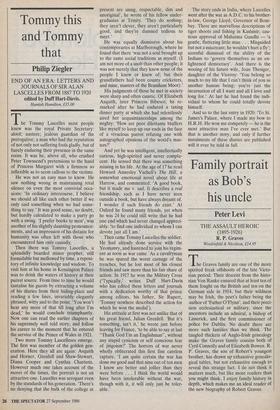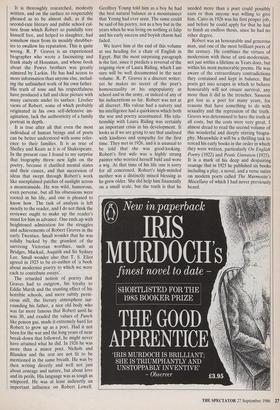Family portrait as Bob's his uncle
Peter Levi
THE ASSAULT HEROIC (1895-1926) R. P. Graves
Weideitfeld & Nicolson, f14.95
The Graves family are one of the more spirited freak offshoots of the late Victo- rian period. Their descent from the histo- rian Von Ranke ensured that at least ten of them fought on the British and ten on the German side in 1914, but their wildness may be Irish, the poet's father being the author of 'Father O'Flynn', and their preci- sion ecclesiastical or military, since the ancestors include an admiral, a bishop of Limerick, and the first commissioner of police for Dublin. No doubt there are more such families than we think. The tangled thickets of Anglo-Irish genealogy make the Graves family cousins both of Cyril Connolly and of Elizabeth Bowen. R. P. Graves, the son of Robert's youngest brother, has drawn up exhaustive genealo- gical tables, but not exhaustive enough to reveal this strange fact. I do not think it matters much, but like more readers than you might think, I enjoy family history in depth, which makes me an ideal reader of the new biography of Robert Graves. It is thoroughly researched, modestly written, and on the surface so respectably phrased as to be almost dull, as if the second-rate literary and public school cul- ture from which Robert so painfully tore himself free, and helped to slaughter, had somehow risen from its mouldy shrubber- ies to swallow his reputation. This is quite wrong. R. P. Graves is an experienced biographer who wrote a fascinating and frank study of Housman, and whose book about the Powys brothers was greatly admired by Larkin. He has had access to more information than anyone else, includ- ing the unfinished work of his own father. His truth of tone and his respectfulness have produced a full and clear picture with many currents under its surface. Livelier views of Robert, some of which probably originated in his own self-defensive im- agination, lack the authenticity of a family portrait in depth.
It is true after all that even the most individual of human beings and of poets can be better understood with some refer- ence to their families It is as true of Shelley and Keats as it is of Shakespeare. In the present case I found to my surprise that biography threw new light on the poetry, because it clarified mental states and their causes, and that succession of ideas that swept through Robert's work like unexplained patches of sunlight across a mountainside. He was wild, humorous, even perverse, but all his obsessions were rooted in his life, and one is pleased to know how. The task of analysis is left mostly to the reader, and I do not think the reviewer ought to make up the reader's mind for him in advance. One ends up with heightened admiration for the struggles and achievements of Robert Graves in the early Twenties. Small wonder that he was solidly backed by the grandest of the surviving Victorian worthies, such as Bridges, Mackail, Asquith and Sir Sydney Lee. Small wonder also that T. S. Eliot agreed in 1925 to be co-author of 'a book about modernist poetry to which we were each to contribute essays'.
The retarded notion of poetry that Graves had to outgrow, his loyalty to Eddie Marsh and the stunting effect of his horrible schools, and more subtly perni- cious still, the literary atmosphere sur- rounding his father, a nice old body who was far more famous that Robert until he was 30, and exuded the values of Punch like poison gas, made it extremely hard for Robert to grow up as a poet. Had it not been for the war and the long years of near break-down that followed, he might never have attained what he did. In 1926 he was more than a minor poet. Nichols and Blunden and the rest are not fit to be mentioned in the same breath. He was by then writing directly and well not just about courage and nature, but about love and its perils. His language was as tough as whipcord. He was at least indirectly an important influence on Robert Lowell. Geoffrey Young told him as a boy he had the best natural balance as a mountaineer that Young had ever seen. The same could be said of his poetry, not as a boy but in the years when he was living on nothing at Islip and his early success and boyish charm had faded.
We leave him at the end of this volume at sea heading for a chair of English in Egypt. But the most surprising paragraph is the last, since it predicts a reversal of the reigning view of Laura Riding, which I am sure will be well documented in the next volume. R. P. Graves is a discreet writer; yet he makes no secret of the poet's homosexuality or his unpopularity at school and in the army, or indeed of any of his indiscretions so far. Robert was not at all discreet. His valour had a naivety and his intelligence had a quirkiness which both the war and poetry accentuated, His rela- tionship with Laura Riding was certainly an important crisis in his development. It looks as if we are going to see that analysed with kindness and sympathy for the first time. They met in 1926, and it is unusual to be told that she was good-looking. Robert's first wife was a highly strung painter who worried herself bald and wore a wig. At that time of his life one is sorry for all concerned. Robert's high-minded mother was a distinctly mixed blessing as he grew older. She did help him financially on a small scale, but the truth is that he needed more than a poet could possibly earn or than anyone was willing to give him. Cairo in 1926 was his first proper job, and before he could apply for that he had to finish an endless thesis, since he had no other degree.
Robert was an honourable and generous man, and one of the most brilliant poets of the century. He combines the virtues of modernism with those of anti-modernism, not just within a lifetime as Yeats does, but within his most memorable poems. He was aware of the extraordinary contradictions they contained and kept in balance. But poets get into scrapes in which to behave honourably will not ensure survival, any more than it did in the trenches. Sassoon got lost as a poet for many years, for reasons that have something to do with sexuality and the repression of the truth. Graves was determined to have the truth at all costs, but the costs were very great. I almost dread to read the second volume of this wonderful and deeply stirring biogra- phy. Meanwhile it will be a thrilling task to reread his early books in the order in which they were written, particularly On English Poetry (1922) and Poetic Unreason (1925). It is a mark of his deep and despairing courage that in 1925 he published six books including a play, a novel, and a verse satire on modern poets called The Marmosite's Miscellany of which I had never previously heard.



























































 Previous page
Previous page